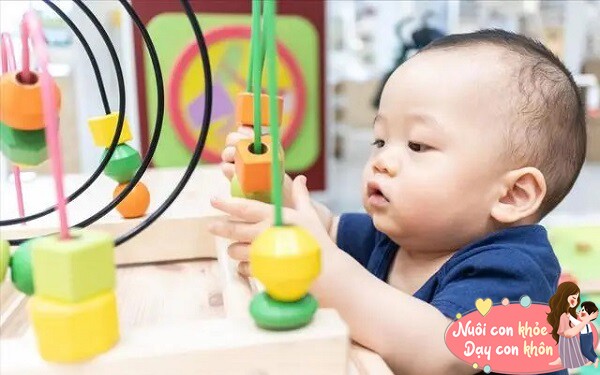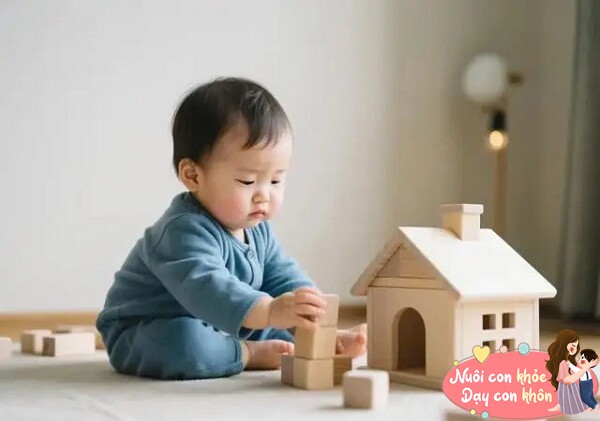The first three years of a child’s life are crucial for brain development, as it grows rapidly and reaches about 80% of its adult size. During this period, the brain develops in size and refines its neural connections, enabling the child to perceive and react to their surroundings.
Seeing your child grow up healthy and talented is a testament to your success as a parent. A child’s healthy development is not only a result of your efforts and care but also indicates a harmonious and fortunate family life.
Here are some daily behaviors that indicate your child’s brain is developing well:


Energetic, Active, and Eager to Explore
An energetic and active child eager to explore exhibits well-developed gross motor skills, language skills, and cognitive abilities. Encourage their curiosity and provide a safe space for them to climb, crawl, and discover new things. Each movement stimulates neural connections, fostering continuous brain development.
If possible, create a safe exploration corner at home with a variety of toys made from different materials, such as soft stuffed animals, rattles, and wooden blocks. Also, provide everyday objects for them to touch, play with, and examine to satisfy their curiosity.

An energetic and active child eager to explore exhibits well-developed gross motor skills.

Imitates and Learns
Children often imitate their parents’ actions, such as raising their hands to their faces when washing or mimicking coughing. Imitation is the first step in a child’s learning process. They learn about the world by observing expressions, movements, and sounds. When they imitate clapping, they are learning body coordination. Similarly, imitating words helps develop language skills, expand vocabulary, and improve communication.
Teaching them to say “hello” lays the foundation for social interactions and future relationships. Create a positive learning environment by paying attention to these behaviors and encouraging them to imitate simple gestures, sounds, and movements. This will foster their natural development in a fun way.

Children often imitate their parents’ actions.

Mischievous and “Destructive”
Children who are mischievous and seem to cause trouble are often highly curious and intelligent. For example, when they take apart toys, they want to understand what’s inside. When they tear paper, they are exploring its texture and the sound it makes. Playing with water allows them to observe its flow and shape.
Each “destructive” act is a thinking and exploration process. The more curious they are, the faster their brains develop. Instead of stopping them, provide opportunities for “legal destruction,” such as old newspapers to tear, toys that make sounds, and building blocks to take apart.

Children are naturally mischievous.
Try building with blocks and then knocking them down, saying, “Oh, the blocks fell down!” Then, guide them to build again, fostering creativity and problem-solving through play.

Quick Reactions and Good Memory
A baby as young as 11 months old may hide their favorite toy under a chair and remember its location after just two days. They might also react to the sound of their father’s keys when he returns from work, turning their head toward the door and giggling. These adorable behaviors showcase their developing memory and cognitive abilities.
Quick reactions and a good memory indicate a flexible and developing brain. Encourage memory and reaction skills by playing games like peek-a-boo, where you cover your face with a cloth and then suddenly reveal it, pointing to your eyes and asking, “Where are mommy’s eyes?”

Quick reactions and a good memory indicate a flexible and developing brain.
Every child is unique, and their intelligence manifests differently. By providing a rich environment and encouraging exploration, imitation, and play, you can foster their optimal brain development. Engage them in diverse activities, such as playing with educational toys, participating in physical games, and exploring nature.
Brain development in the early years is crucial. Create a stimulating environment and encourage your child to explore and learn through play. Spend time interacting with them, creating memorable moments, and nurturing their curiosity. Let’s empower each child to become the best version of themselves.
6 Brain-Damaging Foods: How Your Child’s Daily Diet May Be Harming Their IQ
“Parents, take note! Experts advise caution when it comes to these six foods for toddlers. While a varied diet is essential for growing children, overconsumption of these particular foods may pose potential risks to their developing brains. Read on to discover which foods to moderate and ensure a healthy, balanced diet for your little ones.”



































